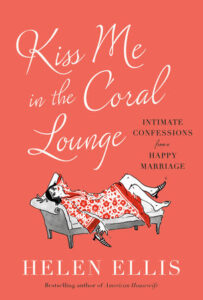
Helen Ellis on Writing About People You Know (in a Nice Way).
“If you’ve told the same story three times this week, write that one.”
This first appeared in Lit Hub’s Craft of Writing newsletter—sign up here.
Write the story you tell everyone. Write the story you tell only your best friends. Write the story that happened five, ten, twenty, a hundred years ago that you heard about and keep bringing up because it always gets a reaction. If you’ve told the same story three times this week, write that one.
So, you know, gossip. You know what’s gossip-worthy and what’s not. When someone tells you they have a story you’ll want to write, you probably won’t. When someone tells you to write a story you just told them, you probably should. You know what should stay a secret. You know better than to exploit someone’s pain. Start with a juicy tidbit that will make your reader lean forward. Halfway through writing about it, you’ll figure out why it’s worth writing about.
Don’t get intimidated by the word essay. Essay sounds snooty. Essay sounds academic. Essay sounds boring. Well, a lot of them are. But the best ones are gossip. The one about the guy who worked as an elf at Santaland. The one about the woman who moved into and then out of the Apthorp on the Upper West Side. And then there’s the one about my father faking his own death for my 13th birthday party. These are essays because they have a moral (which is a snooty, academic, boring word for: the gist). And the gist of the best stories is, as Papa puts it: “Ya gotta make your own fun in life.”
Don’t put off writing because you don’t know how your story ends. Every good story starts in the middle and ends later in the middle. So, start in the middle because that’s where you are.
Write down what people say. Not everything they say (you’re not a stenographer, you’re not a weirdo), just a sentence that sparks your interest and could later spark a story.
I’ve used, “What’s in the box?”
I’ve used, “May I hold your grudge for you?”
I’ve used, “We are not that couple.”
I’ve used, “You’re my last first kiss.”
A good sentence is like a match. One strike can set a house on fire. Or light up an essay. Mama says, “Helen Michelle, I give you a nugget and you dig a gold mine.”
When you write about someone, show them what you wrote.
If someone says you got something wrong about them, get it right. If someone asks you to delete something about them, delete it. If someone wants you to change their name, change it.
My husband says, “You take it too easy on me.”
I say, “That’s because I like being married to you.”
You don’t have to write the story you haven’t told anyone. You don’t have to write about the worst thing that’s happened to you. Just because it happened doesn’t mean you have to write about it. If it’s too hard, don’t write it. If you must, one sentence is often enough. What goes around comes around, so you don’t have to be the one to make it come around on the page. If you seek payback in nonfiction—unfair as this may be—all anyone will talk about is how awful you are. But fiction is entirely fair game. Because revenge is a dish best served in a novel.
_____________________________

Kiss Me in the Coral Lounge by Helen Ellis is available now via Doubleday.
Helen Ellis
Helen Ellis is the acclaimed author of American Housewife and Eating the Cheshire Cat. She is a poker player who competes on the national tournament circuit. Raised in Alabama, she lives with her husband in New York City.



















